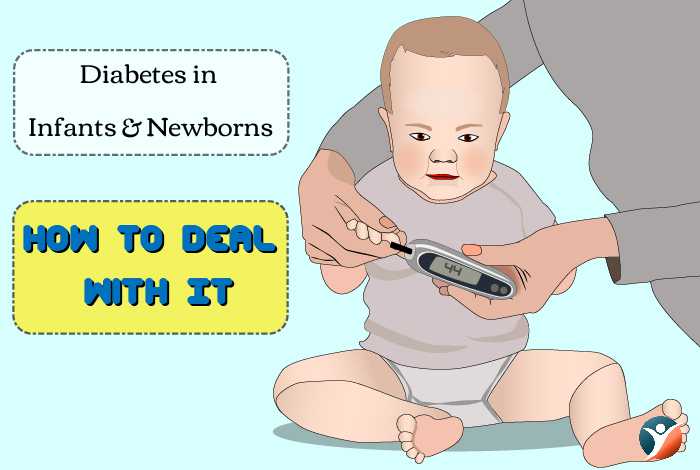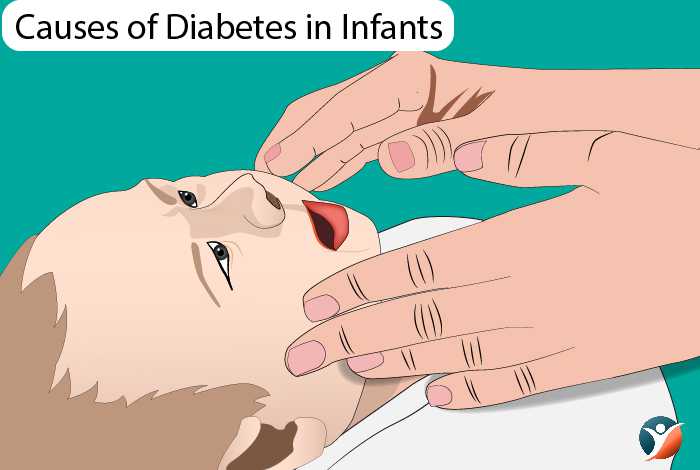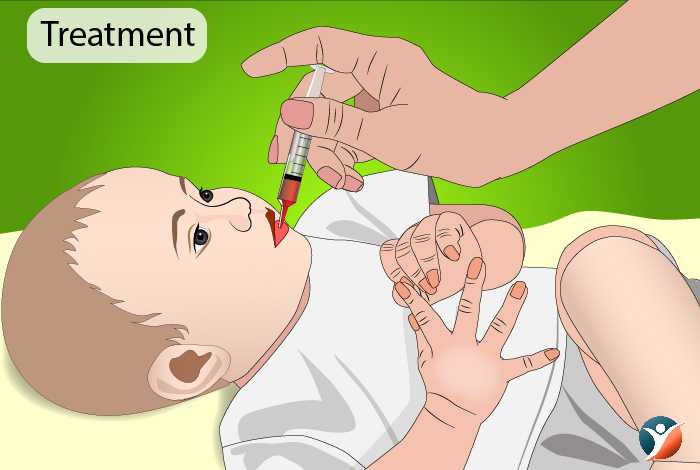
Diabetes in Infants & Newborns – How to Deal with It

Diabetes in infants might sound unusual to you, but this is a modern-day fact that can badly shake lives. Life of a woman takes a whole new turn when she becomes a mother. Bringing a new life into this world & the joy of becoming parents is an inexplicable feeling. We were so ecstatic for the arrival of our little bundle of joy but before it could sink in, we got a shock that shook our lives. Our newborn was diagnosed with diabetes! Our baby would no longer be able to lead a normal life was a thought that shattered us to the core.
But for the sake of his healthy well-being, we collected our broken selves to bestow him with utmost love & care. We explored, researched for all possible information that would help our kid stay healthy.
Here we’re sharing all the information to help every parent for this condition i.e. diabetes in infants and put their best efforts to bring normalcy to their kid’s life.
Table of Content
- Symptoms of Diabetes in Infants
- Causes of Diabetes in Infants
- Risk factors
- Complications
- Prevention
- Managing Your Own Feelings with a Diabetic Newborn
- What Other Family Members Can Do
- What to Follow After the diagnosis
- Treatment
- Things to Expect from the Doctor
- Conclusion
Symptoms of Diabetes in Infants

An infant with type 1 diabetes usually develops visible signs and symptoms quickly, over a period of a few weeks. These symptoms include:
Frequent Urination and Increased Thirst:
Excess blood sugar buildup pulls out fluid from tissues, which might make your newborn thirsty and urinate more. You might have to change the nappy and layers once or twice in an hour.
Extreme Hunger:
Insufficient insulin levels in your kid’s cells might lead to lack of energy that will trigger intense or extreme hunger.
Weight Loss:
Despite unusual eating habits, your infant may drastically lose his/her weight. Without enough energy and sugar supplies, fat stores and muscle tissues can shrink. Abrupt weight loss is one of the first noticed signs of type 1 diabetes in children.
Behavioral Changes:
Your newborn might suddenly start to act weird and feel like crying and irritated all the time.
Fruity-Smelling Breath:
Sometimes blood sugar produces a substance called ketones that may cause a bad or fruity breath.
Yeast Infection:
Infant girls with type 1 diabetes may develop genital yeast infections and baby boys may have diaper rashes.
Blurred Vision:
Too high blood sugar might create focusing issues for your infant.
Causes of Diabetes in Infants

The real cause behind type 1 diabetes is still unknown. But, it is found that people with the problem of type 1 diabetes don’t have an immunity to fight against harmful viruses and bacteria that eventually destroys insulin-producing cells present in the pancreas.
Incidents of diabetes in infants and kids are increasing at a rate of 3-5% every year.[1]
Genetics and environmental factors have their own role in diabetes development.
Insulin in the body is responsible for moving sugar into the bloodstream and other cells. Once pancreatic cells are damaged, your kid’s body produces no insulin which can cause this life-threatening complication.
Risk factors
Risk factors for Type 1 diabetes in children:
- Family history: Having parent or siblings with type 1 issue slightly increases the risk of diabetes development.
- Race: It is observed that non-Hispanic white children have the higher chances of developing type 1 diabetes in the United States.
- Genetic Susceptibility: Certain genes present in DNA can increase the risk of type 1 diabetes in newborns.
Environmental risk factors:
- Diet: Introduction of cereal at the wrong time into a newborn’s diet might play a role in the development of type 1 diabetes. Even cow’s milk has also been linked with this health complication, while breastfeeding can help minimize the risk of developing serious health issues including type 1 diabetes.
- Viruses: Certain viruses may damage body immunity which can result in the destruction of insulin-producing cells in the pancreas.
Complications
Type 1 diabetes complications develop gradually over time. Unstable or high blood sugar levels can eventually be life-threatening or disabling.
These complications can include:
Nerve damage:
Excess blood sugar can injure nerves and blood vessels, especially those present in your kid’s legs. It can cause pain, numbness, tingling or burning sensation. This can take a long time to come into the light and may completely destroy the nerves.
Kidney damage:
Type 1 diabetes can damage clusters of waste filtering blood vessels and can lead to kidney failure in a long run. This can lead to end-stage kidney disease which may require dialysis or transplant for survival.
Heart and blood vessel disease:
Diabetes can not only damage nerves but, it dramatically increases risk of developing serious heart problems such as coronary artery disease, stroke, heart attack, or high blood pressure.
Eye damage:
Type 1 diabetes can damage the retina, results in poor vision and blindness. It may also lead to cataracts and increases the risk of glaucoma.
Skin conditions:
A kid with type 1diabetes is more prone to skin problems such as bacterial infections, itching, and fungal infections.
Prevention
Currently, there is no way discovered to prevent type 1 diabetes. Newborns can be tested for antibodies to reduce the chances of diabetes development. Scientists are still working on its prevention and reducing the pancreatic cell damage in newly diagnosed ones.
While there is no way out but, you can still try to prevent further complications by taking a few measures:
- Help the mother and newborn in keeping blood sugar under control.
- Aware family and other members about the benefits of healthy lifestyle and other good things to keep illnesses at bay
- Scheduling timely visits to a dietitian, healthcare experts or a diabetes educator to check and treat diabetes at the initial stage after diagnosis.
After getting your newborn diagnosed with diabetes, as a parent, you might start thinking of your kid’s future and emotional issues will probably hold you down. So, it is really important for you to understand the things and learn out the ways to deal with the reality.
Managing Your Own Feelings with a Diabetic Newborn
Every parent goes through a bad phase and a grieving process when they find out about their kid’s diabetes. Sometimes, it is really hard to digest the fact that their newborn has a chronic condition and it needs to be managed and taken care for rest of his/her life. The agony is real and normal.
Parents also start feeling guilty and keep pondering what if they could have done something to prevent diabetes and feel unsure about the future to come. They start to panic and look for suggestions, recommendations to fight the battle, a few of them survive with perfection some of them don’t. It is quite common to worry about the issue and experts advise for right and instant medical help.
Try to cope with your own feelings. Don’t panic and get the first things done first. Talk to a healthcare professional and educate yourself to take care of your new family member with diabetes. Support each other emotionally and be there every time to meet the needs of your kid. Share your worries and other stuff with family and friends because you can’t do this all alone. A helping hand would be a good option to deal with the situation.
What Other Family Members Can Do

Diabetes not just affects the ones who have it rather it affects the entire family. His/her siblings might feel complex with all the attention and care that you’re giving to your newborn. Deal with the issues and try to educate the whole family about the complications, preventions and measures to meet the need of your little diabetic.
- Talk openly with other family members such as grandparents, uncles and aunts and tell them about the whole condition of your infant.
- Host a small family meet to tell everyone about diabetes and address them not to worry about the same. This will also give you emotional support as well as financial if in need.
- Talking to a counsellor might be easier for you and share your worries and concern.
- Consider support groups, websites, and books to deal with the type 1 diabetes.
What to Follow After the diagnosis
You’ll need to schedule regular appointments to ensure a good diabetes management plan and keep blood sugar under control. These are some of the periodic tests that your doctor will suggest to check your kid’s:
- Kidney function
- Cholesterol level
- Thyroid Function
In addition, these tests will help doctor:
- To monitor your newborns’ growth and blood pressure
- Check insulin delivering and transportation sites
Treatment

Type 1 diabetes is a disease that won’t go in just one day; it’s a lifelong process that includes insulin therapy, blood sugar monitoring and other lifestyle changes even for an infant. As they grow older changes are need to be done accordingly.
If it seems overwhelming to you, then take one step at a time and follow the measures to keep it under control. There will be days when everything is simply perfect but you must be ready for the worst when you have no control over the blood sugar. Don’t worry and always remember that you’re not alone in all this.
You’ve to deal and work closely with diabetes treatment team to keep everything close to normal as much as you can with your continuous efforts.
Blood sugar monitoring
As a parent, you’re the only one who needs to keep track and record your newborn’s blood sugar every day. Sometime you need to check it at least 4 times a day or probably more to ensure the safety of your kid.
Frequent blood sugar testing is the only way to keep things under a healthy level and get ready will all your resources for the good and bad to come. Your doctor will keep you updated with the safe blood glucose levels and ways of testing will change as your kid age.
Continuous glucose monitoring (CGM)
From the hundreds of ways of glucose tracking, Continuous Glucose Monitoring is latest of all. It’s the most helpful option to get the idea of what’s coming in form of serious health issue such as hypoglycemia.
It is considered as most accurate and standard way to know your kid’s blood sugar level. But it’s not an alternative to traditional blood sugar monitoring. So, if you’re following that way, you’re going well. Talk with a healthcare expert for any change or new experiments to be done to ensure your kid’s health.
Before Every Appointment:
- Note down your concerns and worries about your newborn’s future and well-being.
- Talk to your family and friends to join you. Diabetes management is not easy it looks; being with someone will give you moral support and also help you to memorize things which might you have forgotten in meeting.
- Write down everything that you want to ask your kid’s doctor. Prepare a checklist and put questions about infant’s care and daily lifestyle management. Ask them for recommendations of any specialist that may also help you in this case.
Topics of your concern that you should discuss with dietitian, doctor or, diabetes educator includes:
- Timing and frequency of blood sugar monitoring
- Details related to insulin therapy- dose, time, type of insulin
- Insulin administration- pumps v/s shots
- High blood sugar (hyperglycemia)- learn to recognize and deal with it
- Low blood sugar (hypoglycemia)- learn to recognize and deal with it
- Nutrition- food and its effects on your kid’s blood sugar
- Testing and treatment of ketones
- Carbohydrate counting
- Breastfeeding and your infant’s diabetes
- Medial management and assistance- scheduling visits
Things to expect from the doctor

These are the questions that your doctor will ask you about your life with a diabetic infant, so be ready for them to take your diabetes management to another level:
- Average insulin usage
- Low or high blood sugar episodes
- Your involvement and comfort while managing your kid’s diabetes
- Behavior of your newborn
- How everyone is taking this disease in family
Conclusion
At first, things might haunt you but remember life throws us challenges and it depends on us how to tackle these challenges and move forward.
Diabetes in infants in not quite common so you’ll need to take some special preventive measures to deal with it. It can be managed, it can be dealt with perfection and you can deliver a healthy and happy life your newborn.
Blood glucose monitoring could be a breakthrough in your diabetes management plan and help you keep things under control. It’s the time to welcome your baby into the world with a smile and be focused on his or her health.
If any of the experiences shared above helped you to take care of your infant, don’t forget to tell us in the comments section. Do share this information with family an friends because a small piece of information could be precious for someone.




